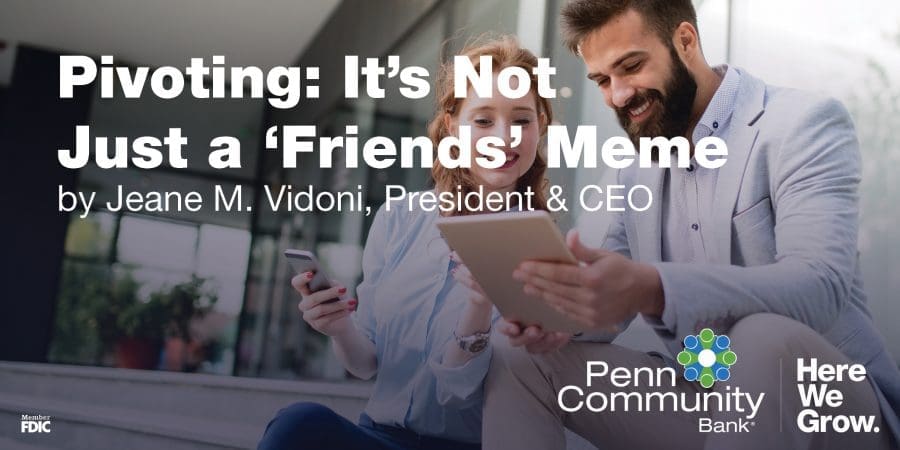
By: Jeane M. Vidoni, Penn Community Bank President & CEO
All of us have experienced a moment in our lives when we were thrown for a loop, when something happens that shakes us up a bit. Maybe we felt like we bombed an important presentation, or maybe we lost a business deal that we had been working hard to close. Or maybe we all were collectively swept up in a global pandemic, which shook up both us and the entire world. These experiences can leave us rattled and doubting, not just ourselves and our own abilities but even our fundamental beliefs about the way our world works.
In every moment such as this, though, there also is opportunity. It may sound Pollyanna-ish, but it really is true: we can learn more from our challenges than from our easy successes, if we are willing to learn from the experience and change course, if needed. If we are willing to pivot.
Now, pivoting can mean any number of things. For some of you, “Pivot” conjures up a now-famous scene from the 1990s sitcom, Friends. You may recall, Ross is trying to get his new couch up the stairs of their New York apartment building, with some assistance from Rachel and Chandler.
Ross has sketched out the entire process of how the couch moving is going to go. But when they start to hoist the large piece of furniture up the metal staircase, things, of course, don’t go as planned. As Chandler and Rachel struggle to lift the couch around the first switchback, Ross shouts “Pivot” at them over and over, until Chandler drops his side of the couch and shouts at Ross to shut up. “I can’t believe that didn’t work,” Ross said. “I know,” Rachel commiserates. “I mean, you had a sketch!”
We all had a sketch of how we thought the past two years of our lives were going to go. Maybe our best friend was getting married. Maybe our family was going to gain a child or a grandchild. Maybe we were finally going to take that trip to Paris. The pandemic scrapped some of those plans completely – weddings were postponed, travel was cancelled. The sketch was not working out the way we thought it would. How were we going to get through it?
Well, like many businesses and families, Penn Community Bank pivoted. We found new ways to do things. And some of those changes have been positive and long lasting.
With in-person meetings cancelled, we held Zoom meetings instead. Even though some in-person meetings have resumed, we still are making good use of video conferencing for routine meetings, and, while Zoom fatigue is real, we’ve found that it helps make us more efficient by cutting down on commuting time.
With in-branch banking closed for much of the past 18 months, we boosted participation on our mobile banking platform. For some customers who had been hesitant to try mobile banking, it has proven to be easier to use than they expected. We expect this mobile conversion to remain high, even after in-branch banking is fully restored for good.
We do expect in-person banking to remain popular with our customers, which is one reason we have moved forward with our plans to reinvest in our retail network. Renovations to the lobby of our Bristol branch recently wrapped up, work at our Perkasie Administrative Center is ongoing, and plans to open a new branch in Lansdale – our second in eastern Montgomery County – are progressing. We aim to open our doors there 2022.
Over the years, I have had the benefit of learning from incredible mentors and professional development coaches. When the pandemic put a halt to in-person classes and meetings, many of us had to find new ways to continue our personal and professional development. We had to adapt to change and develop new habits and new approaches to unlocking our potential. We had to coach ourselves.
Fortunately, there is no shortage of excellent resources available to guide us. One of my favorites is Farnam Street, which shares timeless lessons and insights for work and life through its website, weekly newsletter, and podcast. Its Brain Food newsletter comes out every Sunday and is full of insight and inspiration for the week ahead.
Breaking the Habit of Being Yourself is a great book by author and researcher Dr. Joe Dispenza. It explains how quantum physics, neuroscience, brain chemistry, biology, and genetics combine to shape our decision-making and shares step-by-step tools to apply its principles to your own life, equipping you to make measurable changes in any area.
At Penn Community Bank, we are optimistic about the road ahead. Building an achievement mindset and capitalizing on technology like Salesforce to streamline and organize our workflow will help our team continue to grow together even while we remain physically apart. We have our sketch of how we think the next few years will go – strategic planning has continued throughout the pandemic – but we remain ready, when needed, to pivot.




